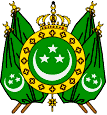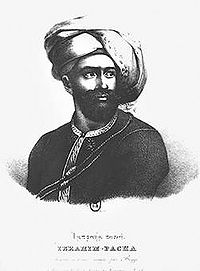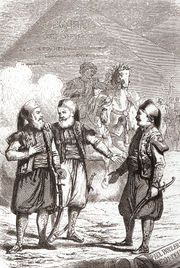Ibrahim Pasha of Egypt
| Ibrahim Pasha | |
|---|---|
Wāli of Egypt, Sudan, Palestine, Syria, Hejaz, Morea, Thasos, Crete |
|
 |
|
| Reign | March 2, 1848 – November 10, 1848 |
| Arabic | إبراهيم باشا |
| Turkish | Kavalalı İbrahim Paşa |
| Ibrahim Pasha | |
| Born | 1789 |
| Birthplace | Drama, Ottoman Empire |
| Died | 10 November 1848 (aged 58–59) |
| Place of death | Cairo, Egypt |
| Buried | Mausoleum of Imam al-Shafi'i, Islamic Cairo, Egypt, November 10, 1848 (11 hours after his death) |
| Predecessor | Muhammad Ali Pasha |
| Successor | Abbas Hilmi I |
| Wives | Hadidja (Birinci Kadin) Chivekiar Hoshiar Ülfet Kalzar Sa'aret |
| Offspring | Muhammad Bey Isma'il Basha Ahmed Rifa'at Mustafa Bahgat Ali Fazil |
| Dynasty | Muhammad Ali Dynasty |
| Father | Muhammad Ali Basha (presumed) |
| Mother | Emina of Nosratli (presumed) |
Ibrahim Pasha (1789 – November 10, 1848) was a 19th century general of Egypt. He is better known as the son of Muhammad Ali of Egypt. He began to command the Egyptian forces when he was merely a teenager and later became known as the Viceroy (Wali) of Egypt, Sudan, Syria, Hejaz, Morea, Thasos and Crete. Ibrahim served as Regent for his father from July to November 10, 1848.
Contents |
Early career
Ibrahim's origins remain unclear. He is sometimes referred to as the "adopted" son of the Albanian Muhammad Ali, said to have been born in Kavala to a repudiated Greek Christian woman.[1] In this account, Ibrahim's mother succeeded in marrying Muhammad Ali, who immeditely adopted her child as his own son giving him the name of Ibrahim and bringing him up in both Ottoman culture and Muslim faith. The rumor of Ibrahim's non-Muslim origins is said to have been made up by a French consul who had been insulted by the pasha.[2]
.jpg)
What is generally accepted is that he was born in 1789, he was Ali's biological son (and second child) by his first wife.[3]. it is further known that he was born in the Ottoman province of Rumelia, in what is now the western parts of Macedonian region in Greece.
In 1805, and during his father's struggle to establish himself in Egypt, the adolescent Ibrahim, at 16, was sent as a hostage to the Ottoman capitan Basha (admiral). But when Muhammad Ali was recognized as Basha and had managed to defeat the expedition of Major General Alexander Mackenzie-Fraser of Great Britain, Ibrahim was allowed to return to Egypt.
When Muhammad Ali went to Arabia to prosecute the war against the Al-Sauds in 1813, Ibrahim was left in command of Upper Egypt. He continued the war with the broken power of the Mameluks, whom he suppressed. In 1816, he succeeded his brother Tusun Basha in command of the Egyptian forces in Arabia.
Campaigns against the House of Saud
Muhammad Ali had already begun to introduce European discipline into his army, and Ibrahim had probably received some training, but his first campaign was conducted more in the old Asiatic style than his later operations. The campaign lasted two years, and ended in the destruction of the House of Saud as a political power. Muhammad Ali landed at Yanbu, the port of Medina, on 1813. The holy cities had been recovered from the Saudis, and Ibrahim's task was to follow them into the desert of Nejd and destroy their fortresses. Such training as the Egyptian troops had received, and their artillery, gave them a marked superiority in the open field. But the difficulty of crossing the desert to the Saudis stronghold of Diriyah, some 400 miles east of Medina, and the courage of their opponents, made the conquest a very arduous one. Ibrahim displayed great energy and tenacity, sharing all the hardships of his army, and never allowing himself to be discouraged by failure. By the end of September 1818, he had forced the Saudi leader to surrender, and had taken Diriyah, which he sacked.
Operations in the Morea

On December 11, 1819 he made a triumphal entry into Cairo. After his return Ibrahim gave effective support to the Frenchman, Colonel Sève (Suleiman Pasha), who was employed to drill the army on the European model. Ibrahim set an example by submitting to be drilled as a recruit. In 1824, Muhammad Ali was appointed governor of the Morea (the Peloponnese peninsula in southern Greece) by Ottoman Sultan Mahmud II. Mahmud actually required the assistance of the well-trained Egyptian army against the contemporary Greek Revolution, which his forces had been unable to quell: in 1822, the Greeks had decisively defeated an army of some 30,000 men under Ibrahim's cousin, Mahmud Dramali Pasha.
Ibrahim was sent to the Peloponnese with a squadron and an army of 17,000 men. The expedition sailed on July 4, 1824, but was for some months unable to do more than come and go between Rhodes and Crete. The fear of the Greek fire ships stopped his way to the Morea. When the Greek sailors mutinied from want of pay, Ibrahim was able to land at Modon on February 26, 1825. He remained in the Morea until the capitulation of October 1, 1828 was forced on him by the intervention of the Western powers.
He defeated the Greeks in the open field, and though the siege of Messolonghi proved costly to his own troops and to the Ottoman forces who operated with him, he brought it to a successful termination on April 24, 1826. The Greek guerrilla bands harassed his army, and in revenge he desolated the country and sent thousands of the inhabitants into slavery in Egypt. These measures of repression aroused great indignation in Europe and led to the intervention of the naval squadrons of the United Kingdom, the Restored Kingdom of France and Imperial Russia in the Battle of Navarino (October 20, 1827). Their victory was followed by the landing of a French expeditionary force in the so called Morea expedition. By the terms of the capitulation of October 1, 1828, Ibrahim evacuated the country.
Campaigns in Syria
In 1831, his father's quarrel with the Porte having become flagrant, Ibrahim was sent to conquer Syria. He took Acre after a severe siege on May 27, 1832, occupied Damascus, defeated an Ottoman army at Homs on July 8 defeated another Ottoman army at Beilan on July 29, invaded Asia Minor, and finally routed the grand vizier Reşid Mehmet Paşa at Konya on December 21. It was there in Syria where he met Umar Tal the mystic, according to accounts Umar Tal healed the son of Ibrahim Pasha from a deadly fever. Umar Tal was inspired by Ibrahim Pasha, when Umar returned to Sokoto he followed the trends set by the Pasha. Umar Tal later became the commander of the Toucouleur in what is now Guinea, Senegal, and Mali.
The Convention of Kütahya on May 6 left Syria for a time in the hands of Muhammad Ali. Ibrahim was undoubtedly helped by Colonel Sève and the European officers in his army. After the campaign of 1832 and 1833, Ibrahim remained as governor in Syria. He might perhaps have administered successfully, but the exactions he was compelled to enforce by his father soon caused the popularity of his government to decline and provoked revolts. He was assisted by French officer Beaufort d'Hautpoul from 1834 to 1837, who was his Chief-of-Staff.[4]
In 1838, the Porte felt strong enough to renew the struggle, and war broke out once more. Ibrahim won his last victory for his father at Nezib on June 24, 1839. But the United Kingdom and the Austrian Empire intervened to preserve the integrity of the Ottoman Empire. Their squadrons cut his communications by sea with Egypt, a general revolt isolated him in Syria, and he was finally compelled to evacuate the country in February 1841.
Last years
Ibrahim spent the rest of his life in peace, but his health was ruined. In 1846 he paid a visit to Western Europe, where he was received with some respect and a great deal of curiosity. When his father became senile, Ibrahim was appointed Regent in his place. He held his regency from July till the time of his death on November 10, 1848.
Honours
- Order of Glory of Turkey-1817
- Knight of the Order of Saint Joseph of Tuscany-1845
- Grand Cross of the Legion d'Honneur of France-1845
- Grand Cross of the Order of the Tower and Sword (GCTE) of Portugal-1846
Notes
- ↑ Maravelea, G.A.: "Sketch of the 1821 Revolution", Gamma Editions, Salonika 1959
- ↑ http://books.google.com/books?id=pzIaAQAAIAAJ&pg=PA348#v=onepage&q=&f=false
- ↑ http://books.google.com/books?id=N9klAAAAMAAJ&pg=PA58#v=onepage&q=&f=false
- ↑ An occasion for war: civil conflict in Lebanon and Damascus in 1860 by Leila Tarazi Fawaz p.114
Bibliography
See Edouard Gouin, L'Egypte au XIX' siècle (Paris, 1847); Aimé Vingtrinier, Soliman-Basha (Colonel Sève) (Paris, 1886). A great deal of unpublished material of the highest interest with regard to Ibrahim's personality and his system in Syria is preserved in the British Foreign Office archives; for references to these see Cambridge Mod. Hist. x. 852, bibliography to chap. xvii.
External links
|
Ibrahim Pasha of Egypt
Born: 1789 Died: November 10, 1848 |
||
| Preceded by Muhammad Ali Basha |
Wāli of Egypt and Sudan 1848 |
Succeeded by Abbas Hilmi I |
|
|||||||||||||||||||||
|
|||||||||||||||||||||||||||||||||||||||||||||||
![]() This article incorporates text from a publication now in the public domain: Chisholm, Hugh, ed (1911). Encyclopædia Britannica (Eleventh ed.). Cambridge University Press.
This article incorporates text from a publication now in the public domain: Chisholm, Hugh, ed (1911). Encyclopædia Britannica (Eleventh ed.). Cambridge University Press.